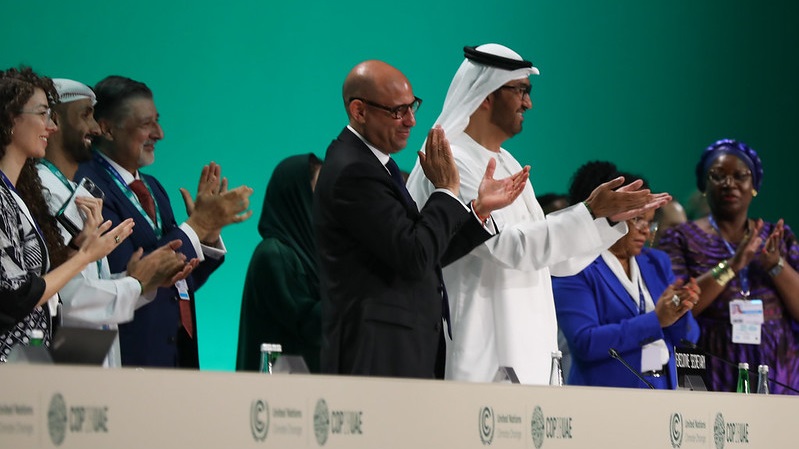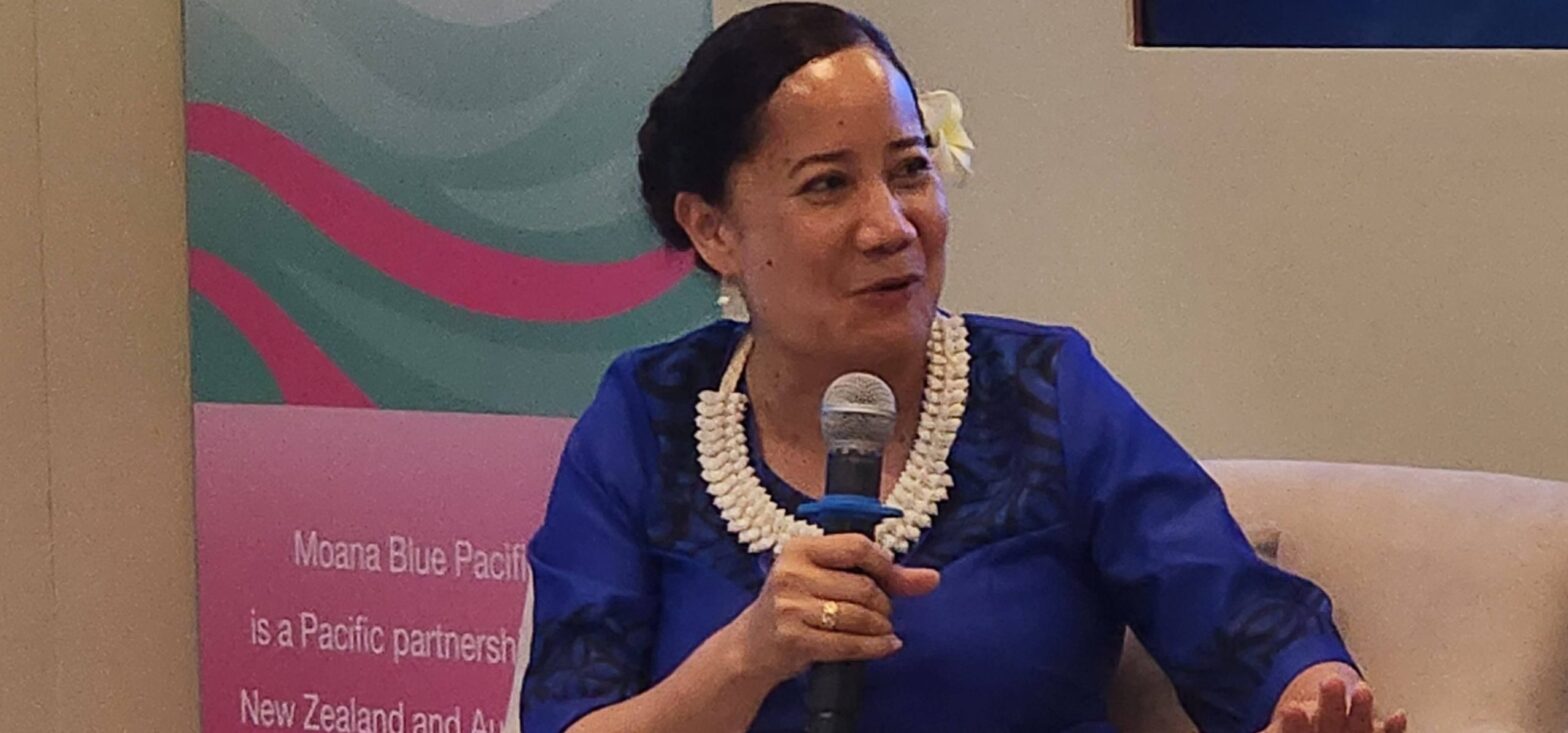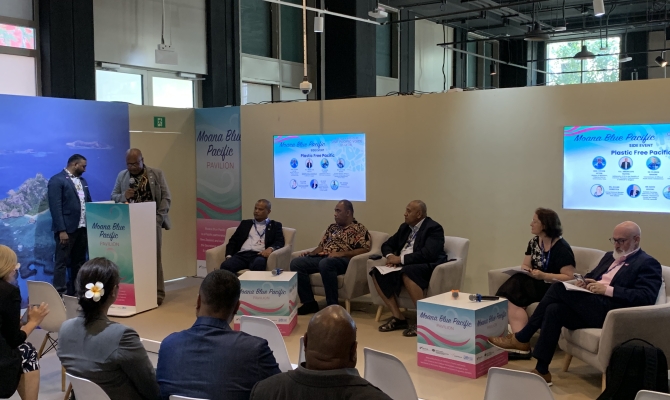The President of COP28 Sultan Al Jaber has announced that participating parties have endorsed the ‘UAE Consensus’ Wednesday, 13 December 2023 in the climate change negotiations in Dubai.
The consensus, supported by representatives from 197 countries that addresses fossil fuels for the first time.
Al Jaber expressed satisfaction with the two weeks of efforts.
“We have worked very hard to secure a better future for our people and our planet,” he said at the closing plenary.
The UAE Consensus marks a major shift by including a reference to transitioning away from all fossil fuels.
“We delivered world first after world first. A global goal to triple renewables and double energy efficiency. Declarations on agriculture, food and health. More oil and gas companies stepping up, for the first time on methane and emissions.
“We have language on fossil fuel for the first time ever,” he stressed.
The COP President’s announcement received applause and a standing ovation.
The newly released Global Stocktake released on Wednesday, urges countries to move away from fossil fuels and achieve net-zero emissions by 2050.
“In unity and solidarity, we will walk the new path the UAE Consensus has set for the world. Together, we will follow our North Star.
“We leave Dubai with our heads held high, and our work goes on in unity and solidarity. We will secure the future of this beautiful planet for the many generations to come.
“We have delivered a comprehensive response to the Global Stocktake, a robust action plan to keep 1.5C in reach. It is a balanced plan built on common ground, strengthened by full inclusivity. It is a historic package to accelerate climate action — the UAE Consensus,” he explained.
Simon Stiell, Executive Secretary of the UNFCCC said although they didn’t turn the page on the fossil fuel era in Dubai, this outcome is the beginning of the end. “We must get on with the job of putting the Paris Agreement fully to work.
“These climate conferences are of course a consensus-based process, meaning all Parties must agree on every word, every comma, every full stop.
“This is not easy. It’s not easy at all. Indeed, it underscores just how much these UN conferences have achieved in recent decades.
“Without them we would be headed for close to 5 degrees of warming. An open-and-shut death sentence for our species.
“We are currently headed for just under 3 degrees. It still equates to mass human suffering, which is why COP28 needed to move the needle further,” he said.
U.S Special Envoy for Climate John Kerry acknowledged the strength of the outcome.
“While each of us may find areas for improvement, this document sends a very strong message to the world,” he said in Dubai.
UN Secretary General, Antonio Guterres also emphasised the importance of a fossil fuel phase-out, expressing hope that it doesn’t come too late.
“Whether you like it or not, fossil fuel phase out is inevitable. Let’s hope it doesn’t come too late.
“Science tells us that limiting global heating to 1.5°C will be impossible without the phase out of fossil fuels. This was also recognised by a growing and diverse coalition of countries at COP28. The era of fossil fuels must end – and it must end with justice and equity,” Guterres said.
“This COP28 marks the beginning of the end of the fossil fuel era. It is an historical decision. For the first time in decades of climate diplomacy, around 200 countries have agreed to address the origin of the climate crisis: our dependence to fossil fuels,” said Teresa Ribera, Minister for the Ecological Transition and the Demographic Challenge of Spain.
“This draft is a sorely needed improvement from the last version, which rightly caused outrage…. The language on fossil fuels is much improved, but still falls short of calling for the full phase-out of coal, oil and gas,” said WWF’s Stephen Cornelius.
Meanwhile, Alliance of Small Islands States (AOSIS) lead negotiator Anne Rasmussen from Samoa, delivered a statement expressing concerns over the Global Stocktake (GST) text adopted during the session.
While acknowledging the collective effort, Rasmussen raised a procedural issue that the absence of small island developing states during the decision-making moment.
“We did not want to interrupt you, but we are a little confused about what just happened. It seems that you gavelled the decisions, and the small island developing states were not in the room,” she said.
AOSIS, representing 39 small island developing states disproportionately affected by climate change, emphasised their commitment to safeguarding the 1.5-degree Celsius target.
Rasmussen highlighted the significance of the first GST.
“Our leaders and Ministers have been clear. We cannot afford to return to our islands with the message that this process has failed us,” she stressed.
While acknowledging positive elements in the draft text, such as strong references to science and milestones for enhanced Nationally Determined Contributions (NDCs) until 2025, AOSIS expressed reservations.
“The question we have considered as AOSIS is whether they are enough,” Rasmussen explained.
Drawing attention to paragraphs 26-29, Rasmussen argued that a necessary course correction has not been achieved.
“We have made an incremental advancement over business as usual when what we really needed is an exponential step-change in our actions and support.”
AOSIS expressed dissatisfaction with paragraph 26 for lacking a commitment or invitation for Parties to peak emissions by 2025, despite referencing the scientific imperative.
Concerns were raised about paragraph 28, particularly sub-paragraphs 28(d), (e), and (h), with AOSIS highlighting issues related to an exclusive focus on energy systems and potential setbacks in endorsing certain technologies.
Rasmussen reiterated concerns about paragraph 11, stressing that AOSIS had repeatedly requested its relocation to the preamble in line with the Paris Agreement, which was ignored.
“We must leave here with a set of decisions that meet the magnitude of the climate crisis, that meet the expectations that the world has of us, and that meet what is needed to secure the future of the coming generations,” she said.
This story was written by Pita Ligaiula, originally published at PACNEWS on 14 December 2023, reposted via PACNEWS.



